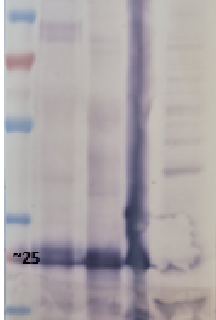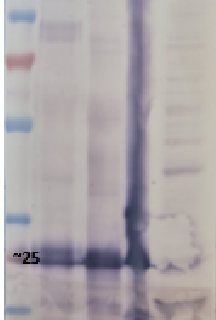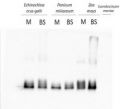1

Anti- Lhcb1 | LHCII type I chlorophyll a/b-binding protein
AS24 5034 | Clonality: Polyclonal | Host: Rabbit | Reactivity: Hordeum vulgare, Zea mays
Currrent replacement: AS09 522
- Product Info
-
Immunogen: KLH-conjugated peptide derived from Arabidopsis thaliana Lhcb1 protein sequence of Lhcb1 isoforms 1-5. Chosen peptide is conserved in monocotyl Lhcb1 protein sequences.
Lhcb1.1 UniProt: P0CJ48-1, TAIR: AT1G29920
Lhcb1.2 UniProt: Q8VZ87-1, TAIR: AT1G29910
Lhcb1.3 UniProt: P04778-1, TAIR: AT1G2993
Lhcb1.4 UniProt: Q39142-1, TAIR: AT2G34430
Lhcb1.5 UniProt: Q39141-1, TAIR: At2g34420
The peptide is conserved in several di and monocotyl Lhcb1 proteins.Host: Rabbit Clonality: Polyclonal Purity: Antigen affinity purified serum, in PBS pH 7.4 Format: Lyophilized Quantity: 50 µg Reconstitution: For reconstitution, add 50 µl of sterile or deionized water. Storage: Store lyophilized/reconstituted at -20°C; once reconstituted make aliquots to avoid repeated freeze-thaw cycles. Please, remember to spin tubes briefly prior to opening them to avoid any losses that might occur from lyophilized material adhering to the cap or sides of the tubes. Tested applications: Western blot (WB) Recommended dilution: 1 : 500 - 1: 5000 (WB) Expected | apparent MW: 28 | 25 kDa - Reactivity
-
Confirmed reactivity: Arabidosis thaliana, Hordeum vulgare, Zea mays Predicted reactivity: Arachis hypogaea, Brassica napus, Camellia sinensis, Chlamydomonas reinhardii, Hordeum vulgare, Mesembryanthemum crystallinum, Nicotiana tabacum, Oryza sativa, Pisum sativum, Phaseolus vulgaris, Sinapsis alba, Spinacia oleracea, Triticum aestivum, Zea mays.
Species of your interest not listed? Contact usNot reactive in: cyanobacteria - Application Examples
-

Samples:
1 - MW marker
2 - 10 µg of Zea mays whole leaf extract
3 - 10 µg of Hordeum vulgare whole leaf extract
4 - 10 µg of thylakoid of Arabidopsis thaliana
5 - 10 µg of cyanobacterial whole cell extract (negative control)10 µg/well of samples 1-5 were extracted and loaded in each well following denaturation with Invitrogen LDS sample buffer (4X) at 70°C/5 min. Samples were separated on Invitrogen NuPage Bis-Tris 4-12% SDS-PAGE and blotted for 1 h to Invitrogen PVDF (pore size of 0.45 um), using wet transfer. Blot was blocked with 5% nonfat milk in TBS-T for: 1h/RT with agitation. Blot was incubated in the primary antibody at a dilution of 1: 1 500 for 4ªC/ON in TBS-T Blocking. The antibody solution was decanted, and the blot was rinsed briefly twice, then washed once for 15 min and 3 times for 5 min in TBS-T at RT with agitation. Blot was incubated in matching secondary antibody (anti-rabbit IgG ALP conjugated, AS09 607 lot 2503) diluted to 1: 1 000 in TBS-T Blocking for 0,5h/RT with agitation. The blot was washed as above and developed with AS19 BCIP-NBT-PLUS lot 03088241 for 3min. As soon as the desired band is detectable, briefly wash the membrane in generous amounts of deionized water. Image was captured after 2h.
Note: for more sensitive detection method the antibody can be used in higher dilution and lower protein load/well, which will also contribute to lower background signal.
Courtesy Agrisera - Background
-
Background: The major light-harvesting antenna complex II (LHCII) in photosynthetic eukaryotes is located in the thylakoid membrane of the chloroplast. It is a heterotrimeric complex formed by up to 3 different individual subtypes of chlorophyll a/b-binding proteins: Lhcb1, Lhcb2, and Lhcb3. Lhcb1 is the most abundant chlorophyll a/b-binding protein in eukaryotic phototrophs and often is coded by several nuclear genes.
A molecular characterisation of the LHCII proteins can be found in Caffarri et al. (2004) A Look within LHCII: Differential Analysis of the Lhcb1−3 Complexes Building the Major Trimeric Antenna Complex of Higher-Plant Photosynthesis. Biochemistry 43 (29): 9467–9476 - Protocols
-
Agrisera Western Blot protocol and video tutorials
Protocols to work with plant and algal protein extracts
Agrisera Educational Poster Collection - Reviews:
-
This product doesn't have any reviews.
Accessories

AS01 005 | Clonality: Polyclonal | Host: Rabbit | Reactivity: Monocots and dicots including A. thaliana, A. hypogaea, C. reticulata, C. quitensis Kunt Bartl, E. crus-galli, F. margarita Swingle, G. hybrid, H. vulgare, L. esculentum (Solanum lycopersicum), N. tabacum, O. sativa, P. kurroa,, P. miliaceum, P. patens, P. sativum, P. strobus, P.vulgaris, S. lycopersicum, S. oleracea, Triticum aestivum, Z. mays


